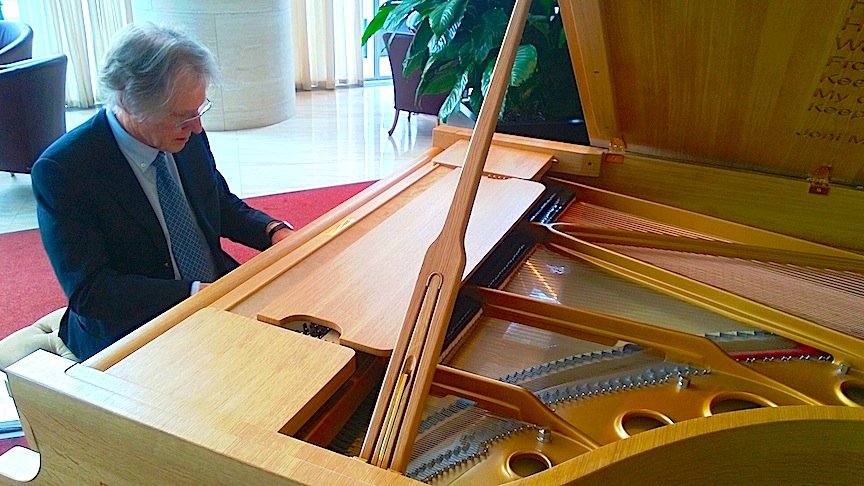
Friday’s quiet Toronto arrival of 68-year-old Italian pianomaker Paolo Fazioli to officially unveil a new oak-trimmed grand piano specially made by his factory for the Shangri-La Hotel was officially all about beauty and craftsmanship. But it was also a public relations exercise that underscored big recent changes in a cutthroat piano market.
- Classical Music 101: What Does A Conductor Do? - June 17, 2019
- Classical Music 101 | What Does Period Instrument Mean? - May 6, 2019
- CLASSICAL MUSIC 101 | What Does It Mean To Be In Tune? - April 23, 2019
Toronto has been no exception to an international shakedown that has seen inexpensive Chinese- and Indonesian-built pianos take over the heart of the market for upright and small grand pianos — the kinds of pianos regular people have in their living rooms and buy for their talented children.
The older North American and European makers have been hurting badly.
Even the luxury end of the market has been affected.
In Toronto, the world’s best-known maker of concert pianos, Steinway, took away its franchise from Remenyi House of Music, which sits across the street from the Royal Conservatory of Music, awarding it to Vancouver-based piano dealer Tom Lee, who expanded his store in Markham to accommodate the prestigious brand.
In response, Remenyi’s picked up some fine German brands, including August Förster, Blüthner and Bechstein, which had been carried by Richmond Hill’s Cosmo Music.
Yesterday, Michael Remenyi was standing in the Shanri-La Lobby not too far away from Fazioli, proud to announce that he is now also the local representative for Fazioli pianos — a relatively recent but highly prized brand that had up to now been carried by Merriam Music in Oakville.
Merriam continues to sell a wide range of brands, including American Steinway competitor Mason & Hamlin and Germany’s Grotrian.
The two remaining high-end brands vying in the local market are Bösendorfer, long sold by Robert Lowrey’s in Leaside, and Streingraeber & Sohne, handled by Grand Piano House in the former King City (Richmond Hill).
With prices exceeding $100,000 for concert models, these pianos are the stuff of dreams for impoverished artists, and remain an aspirational object for the living rooms of the well-off. But competition is fierce.
And, according to Remeyi, there is no spare stock of Fazioli instruments at the moment, which means waiting at least six months for a factory order to arrive. That is why having one’s brand name in a luxury hotel lobby can be a fine calling card.
In fact, this was Fazioli’s third Canadian hotel-lobby placement, the first two having taken place in Vancouver.
The marketers of the Fazioli brand like to associate the pianos with other exotic Italian luxury products, but the refreshing thing about Paolo Fazioli — and the owners of most other boutique instrument makers — is that they are music enthusiasts first and foremost.
Fazioli, whose family made its fortune with three furniture factories in Italy, studied piano and engineering, deciding in the mid-1970s that he’d like to build a better concert piano. He requisitioned a small corner of one of the family’s furniture factories and set to work.
Now the company is recognized as making some of the finest hand-crafted instruments in the world. Canada’s Angela Hewitt is one of the brand’s biggest cheerleaders, and Louis Lortie has also expressed his love of this brand’s light touch and homogeneous sound.
Having Fazioli in town was a great opportunity for an interview, which I’ve captured in the 12-minute podcast, below.
I was struck by the pianomaker’s devotion to the minutiae of making a piano sound better. Interestingly enough, one of his current areas of research involves trying to reconcile the sound we hear coming from a piano with the representation of that sound in computer modelling. It should be similar, but it isn’t.
“Our way to hear is not strictly mathematics of physics,” said Fazioli. This may seem self-evident, in a way, but it poses a major obstacle for any scientifically-minded person interested in the production of sounds we consider pleasing.
Fazioli said that his main impetus 30-odd years ago was producing a particular sound quality, one he continues to hone on the factory floor as well as his research lab every day.
The simplest test of that sound? Piano pieces that explore different aspects of an instrument’s tonality.
I thought Fazioli’s list might make a good starting point for anyone considering a piano purchase — upright or grand, new or used:
-For bass, Fazioli recommends the opening movement of Beethoven’s “Moonlight” Sonata.
-For power, try a Chopin Polonaise or a Brahms Rhapsody or a Rachmaninov Prelude.
-For cantabile (the piano’s ability to sing), “there’s nothing finer than a Mozart Adagio movement,” smiled Fazioli. “He is No. 1 for cantabile.”
-For clarity: Debussy’s Clair de lune — “you can feel every nuance,” said Fazioli.
For an overall assessment, Fazioli recommended Schumann’s Papillons.
He had much more to say on the art of making a fine piano here:
John Terauds
- Classical Music 101: What Does A Conductor Do? - June 17, 2019
- Classical Music 101 | What Does Period Instrument Mean? - May 6, 2019
- CLASSICAL MUSIC 101 | What Does It Mean To Be In Tune? - April 23, 2019



